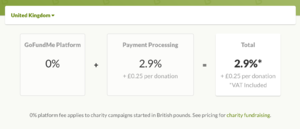Yep.I know it's swings and roundabouts because you still pay towards the fundraising platform
A donor can choose not to tip GoFundMe, making the platform fee £0:

However, GoFundMe's payment processing still takes away 2.9% + £0.25 per donation (which I think is not unreasonable compared with other online payment processors - one can google for comparisons, "online payment gateway fees comparison" etc.). And in regards to other online fundraising tools, JustGiving, for example, takes a 5% fee for each donation.


 Founder
Founder Member
Member , and I made some very good returns on two medical companies. One made a cutting edge breakthrough in treating leukaemia and the other sold contraceptives.
, and I made some very good returns on two medical companies. One made a cutting edge breakthrough in treating leukaemia and the other sold contraceptives.

